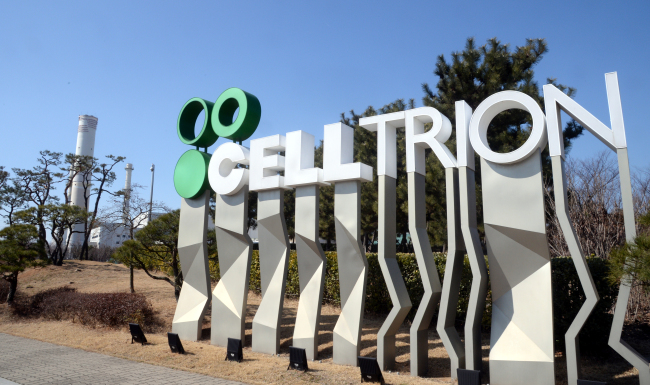South Korean biopharmaceutical company Celltrion announced Thursday that the US Food and Drug Administration had approved Truxima, a biosimilar referencing Rituxan, for the treatment of non-Hodgkin’s lymphoma.
Truxima is the first-ever Rituxan biosimilar to be approved in the US and is therefore expected to reap gains from being an exclusive product in the drug segment. It was developed by Celltrion and will be marketed in the US by Teva Pharmaceutical Industries.
 |
Celltrion`s headquarters in Songdo, Incheon (Park Hyun-koo/The Korea Herald) |
“The approval of Truxima is a significant milestone for Celltrion and, more notably, for the patients who need access to this important medication,” Celltrion CEO Kee Woo-sung said in a statement.
“Truxima is the very first rituximab biosimilar to be approved in the United States for three non-Hodgkin’s lymphoma indications and may help provide greater accessibility for patients,” Kee said.
Biosimilars are cheaper, near-replicas of cell-based biologic drugs whose patents have expired, which includes many of the world’s top-selling blockbuster drugs, like Rituxan.
For the time being, Celltrion’s Truxima is likely to remain the only Rituxan-referencing biosimilar in the US, as industry competitor Sandoz, the biosimilars unit of Novartis, recently terminated further plans to develop and launch a Rituxan biosimilar in the US.
Truxima is a biosimilar version of Roche’s Rituxan (rituximab), also labeled MabThera, used to treat non-Hodgkin’s lymphoma, a cancer that originates from white blood cells that are integral to the body’s immune system.
Last year, Roche raised around 5 trillion won ($4.4 billion) with Rituxan in the US, with the drug bringing in approximately $7.9 billion in worldwide sales, according to Roche’s 2017 annual report.
Celltrion’s Truxima is already available in Europe, as the drug was approved in February 2017. Sales of Truxima began in the UK in April this year, and it has since taken a 32 percent share of the country’s rituximab market, Celltrion said, citing market data from IQVIA.
Looking ahead, Celltrion expects the US drug regulator to approve Herzuma, a biosimilar referencing Herceptin, in the near future, as it was submitted around the same time as Truxima.
In addition to the two biosimilars, the Korean drugmaker was the first to develop and commercialize a biosimilar referencing Remicade, Remsima, in the US and Europe.
By Sohn Ji-young (
jys@heraldcorp.com)








